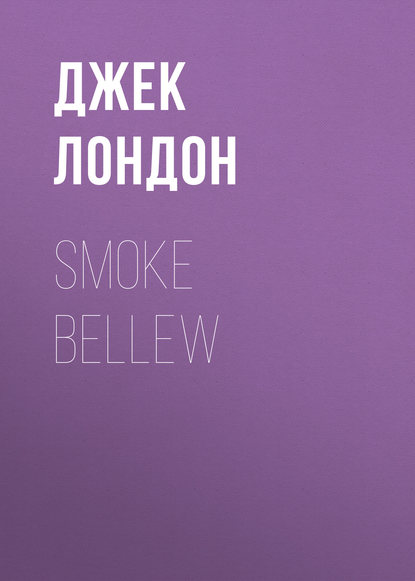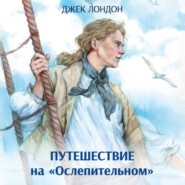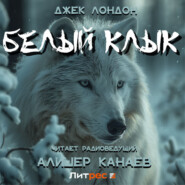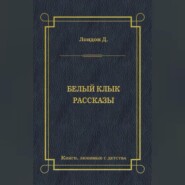По всем вопросам обращайтесь на: info@litportal.ru
(©) 2003-2024.
✖
Smoke Bellew
Настройки чтения
Размер шрифта
Высота строк
Поля
“I was minded you’d run without me,” McCan explained when they came up, his small peering eyes glimmering with cunning. “So I kept an eye on the girl, an’ when I seen her caching skees an’ grub, I was on. I’ve brought my own skees an’ webs an’ grub. The fire? Sure, an’ it was no danger. The camp’s asleep an’ snorin’, an’ the waitin’ was cold. Will we be startin’ now?”
Labiskwee looked swift consternation at Smoke, as swiftly achieved a judgement on the matter, and spoke. And in the speaking she showed, child-woman though she was in love, the quick decisiveness of one who in other affairs of life would be no clinging vine.
“McCan, you are a dog,” she hissed, and her eyes were savage with anger. “I know it is in your heart to raise the camp if we do not take you. Very well. We must take you. But you know my father. I am like my father. You will do your share of the work. You will obey. And if you play one dirty trick, it would be better for you if you had never run.”
McCan looked up at her, his small pig-eyes hating and cringing, while in her eyes, turned to Smoke, the anger melted into luminous softness.
“Is it right, what I have said?” she queried.
Daylight found them in the belt of foothills that lay between the rolling country and the mountains. McCan suggested breakfast, but they held on. Not until the afternoon thaw softened the crust and prevented travel would they eat.
The foothills quickly grew rugged, and the stream, up whose frozen bed they journeyed, began to thread deeper and deeper canyons. The signs of spring were less frequent, though in one canyon they found foaming bits of open water, and twice they came upon clumps of dwarf willow upon which were the first hints of swelling buds.
Labiskwee explained to Smoke her knowledge of the country and the way she planned to baffle pursuit. There were but two ways out, one west, the other south. Snass would immediately dispatch parties of young men to guard the two trails. But there was another way south. True, it did no more than penetrate half-way into the high mountains, then, twisting to the west and crossing three divides, it joined the regular trail. When the young men found no traces on the regular trail they would turn back in the belief that the escape had been made by the west traverse, never dreaming that the runaways had ventured the harder and longer way around.
Glancing back at McCan, in the rear, Labiskwee spoke in an undertone to Smoke. “He is eating,” she said. “It is not good.”
Smoke looked. The Irishman was secretly munching caribou suet from the pocketful he carried.
“No eating between meals, McCan,” he commanded. “There’s no game in the country ahead, and the grub will have to be whacked in equal rations from the start. The only way you can travel with us is by playing fair.”
By one o’clock the crust had thawed so that the skees broke through, and before two o’clock the web-shoes were breaking through. Camp was made and the first meal eaten. Smoke took stock of the food. McCan’s supply was a disappointment. So many silver fox-skins had he stuffed in the bottom of the meat bag that there was little space left for meat.
“Sure an’ I didn’t know there was so many,” he explained. “I done it in the dark. But they’re worth good money. An’ with all this ammunition we’ll be gettin’ game a-plenty.”
“The wolves will eat you a-plenty,” was Smoke’s hopeless comment, while Labiskwee’s eyes flashed their anger.
Enough food for a month, with careful husbanding and appetites that never blunted their edge, was Smoke’s and Labiskwee’s judgment. Smoke apportioned the weight and bulk of the packs, yielding in the end to Labiskwee’s insistence that she, too, should carry a pack.
Next day the stream shallowed out in a wide mountain valley, and they were already breaking through the crust on the flats when they gained the harder surface of the slope of the divide.
“Ten minutes later and we wouldn’t have got across the flats,” Smoke said, when they paused for breath on the bald crest of the summit. “We must be a thousand feet higher here.”
But Labiskwee, without speaking, pointed down to an open flat among the trees. In the midst of it, scattered abreast, were five dark specks that scarcely moved.
“The young men,” said Labiskwee.
“They are wallowing to their hips,” Smoke said. “They will never gain the hard footing this day. We have hours the start of them. Come on, McCan. Buck up. We don’t eat till we can’t travel.”
McCan groaned, but there was no caribou suet in his pocket, and he doggedly brought up the rear.
In the higher valley in which they now found themselves, the crust did not break till three in the afternoon, at which time they managed to gain the shadow of a mountain where the crust was already freezing again. Once only they paused to get out McCan’s confiscated suet, which they ate as they walked. The meat was frozen solid, and could be eaten only after thawing over a fire. But the suet crumbled in their mouths and eased the palpitating faintness in their stomachs.
Black darkness, with an overcast sky, came on after a long twilight at nine o’clock, when they made camp in a clump of dwarf spruce. McCan was whining and helpless. The day’s march had been exhausting, but in addition, despite his nine years’ experience in the arctic, he had been eating snow and was in agony with his parched and burning mouth. He crouched by the fire and groaned, while they made the camp.
Labiskwee was tireless, and Smoke could not but marvel at the life in her body, at the endurance of mind and muscle. Nor was her cheerfulness forced. She had ever a laugh or a smile for him, and her hand lingered in caress whenever it chanced to touch his. Yet, always, when she looked at McCan, her face went hard and pitiless and her eyes flashed frostily.
In the night came wind and snow, and through a day of blizzard they fought their way blindly, missing the turn of the way that led up a small stream and crossed a divide to the west. For two more days they wandered, crossing other and wrong divides, and in those two days they dropped spring behind and climbed up into the abode of winter.
“The young men have lost our trail, an’ what’s to stop us restin’ a day?” McCan begged.
But no rest was accorded. Smoke and Labiskwee knew their danger. They were lost in the high mountains, and they had seen no game nor signs of game. Day after day they struggled on through an iron configuration of landscape that compelled them to labyrinthine canyons and valleys that led rarely to the west. Once in such a canyon, they could only follow it, no matter where it led, for the cold peaks and higher ranges on either side were unscalable and unendurable. The terrible toil and the cold ate up energy, yet they cut down the size of the ration they permitted themselves.
One night Smoke was awakened by a sound of struggling. Distinctly he heard a gasping and strangling from where McCan slept. Kicking the fire into flame, by its light he saw Labiskwee, her hands at the Irishman’s throat and forcing from his mouth a chunk of partly chewed meat. Even as Smoke saw this, her hand went to her hip and flashed with the sheath-knife in it.
“Labiskwee!” Smoke cried, and his voice was peremptory.
The hand hesitated.
“Don’t,” he said, coming to her side.
She was shaking with anger, but the hand, after hesitating a moment longer, descended reluctantly to the sheath. As if fearing she could not restrain herself, she crossed to the fire and threw on more wood. McCan sat up, whimpering and snarling, between fright and rage spluttering an inarticulate explanation.
“Where did you get it?” Smoke demanded.
“Feel around his body,” Labiskwee said.
It was the first word she had spoken, and her voice quivered with the anger she could not suppress.
McCan strove to struggle, but Smoke gripped him cruelly and searched him, drawing forth from under his armpit, where it had been thawed by the heat of his body, a strip of caribou meat. A quick exclamation from Labiskwee drew Smoke’s attention. She had sprung to McCan’s pack and was opening it. Instead of meat, out poured moss, spruce-needles, chips – all the light refuse that had taken the place of the meat and given the pack its due proportion minus its weight.
Again Labiskwee’s hand went to her hip, and she flew at the culprit only to be caught in Smoke’s arms, where she surrendered herself, sobbing with the futility of her rage.
“Oh, lover, it is not the food,” she panted. “It is you, your life. The dog! He is eating you, he is eating you!”
“We will yet live,” Smoke comforted her. “Hereafter he shall carry the flour. He can’t eat that raw, and if he does I’ll kill him myself, for he will be eating your life as well as mine.” He held her closer. “Sweetheart, killing is men’s work. Women do not kill.”
“You would not love me if I killed the dog?” she questioned in surprise.
“Not so much,” Smoke temporized.
She sighed with resignation. “Very well,” she said. “I shall not kill him.”
The pursuit by the young men was relentless. By miracles of luck, as well as by deduction from the topography of the way the runaways must take, the young men picked up the blizzard-blinded trail and clung to it. When the snow flew, Smoke and Labiskwee took the most improbable courses, turning east when the better way opened south or west, rejecting a low divide to climb a higher. Being lost, it did not matter. Yet they could not throw the young men off. Sometimes they gained days, but always the young men appeared again. After a storm, when all trace was lost, they would cast out like a pack of hounds, and he who caught the later trace made smoke signals to call his comrades on.
Smoke lost count of time, of days and nights and storms and camps. Through a vast mad phantasmagoria of suffering and toil he and Labiskwee struggled on, with McCan somehow stumbling along in the rear, babbling of San Francisco, his everlasting dream. Great peaks, pitiless and serene in the chill blue, towered about them. They fled down black canyons with walls so precipitous that the rock frowned naked, or wallowed across glacial valleys where frozen lakes lay far beneath their feet. And one night, between two storms, a distant volcano glared the sky. They never saw it again, and wondered whether it had been a dream.
Crusts were covered with yards of new snow, that crusted and were snow-covered again. There were places, in canyon- and pocket-drifts, where they crossed snow hundreds of feet deep, and they crossed tiny glaciers, in drafty rifts, wind-scurried and bare of any snow. They crept like silent wraiths across the faces of impending avalanches, or roused from exhausted sleep to the thunder of them. They made fireless camps above timber-line, thawing their meat-rations with the heat of their bodies ere they could eat. And through it all Labiskwee remained Labiskwee. Her cheer never vanished, save when she looked at McCan, and the greatest stupor of fatigue and cold never stilled the eloquence of her love for Smoke.
Like a cat she watched the apportionment of the meager ration, and Smoke could see that she grudged McCan every munch of his jaws. Once, she distributed the ration. The first Smoke knew was a wild harangue of protest from McCan. Not to him alone, but to herself, had she given a smaller portion than to Smoke. After that, Smoke divided the meat himself. Caught in a small avalanche one morning after a night of snow, and swept a hundred yards down the mountain, they emerged half-stifled and unhurt, but McCan emerged without his pack in which was all the flour. A second and larger snow-slide buried it beyond hope of recovery. After that, though the disaster had been through no fault of his, Labiskwee never looked at McCan, and Smoke knew it was because she dared not.
It was a morning, stark still, clear blue above, with white sun-dazzle on the snow. The way led up a long, wide slope of crust. They moved like weary ghosts in a dead world. No wind stirred in the stagnant, frigid calm. Far peaks, a hundred miles away, studding the backbone of the Rockies up and down, were as distinct as if no more than five miles away.
“Something is going to happen,” Labiskwee whispered. “Don’t you feel it? – here, there, everywhere? Everything is strange.”
“I feel a chill that is not of cold,” Smoke answered. “Nor is it of hunger.”
“It is in your head, your heart,” she agreed excitedly. “That is the way I feel it.”

















